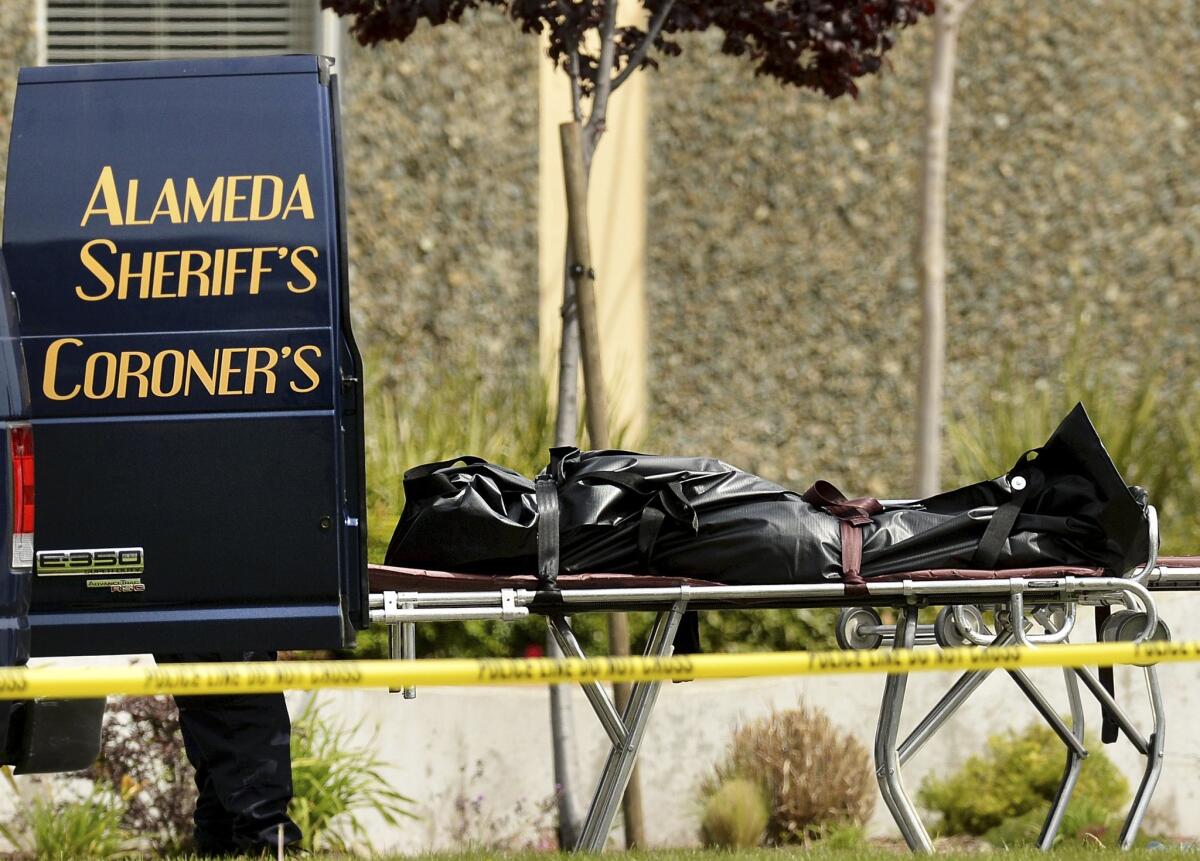California coroners have issues with new assisted death law

A body is loaded into an Alameda County coroner’s van in Oakland in 2012. Coroners around the state are wondering about procedural issues under the new law allowing assisted death for terminally ill Californians.
- Share via
Reporting from Sacramento — A group representing county coroners in California says several problems need to be addressed in the new assisted-death law signed this week by Gov. Jerry Brown.
The measure allows physicians to prescribe lethal doses of drugs to terminally ill patients diagnosed with fewer than six months to live.
“We have a lot of concerns about the language,” said Rocky Shaw, a supervising investigator for San Bernardino County and president of the California State Coroners Assn. “There are a lot of details to be worked out.”
One is what to list on death certificates as the immediate cause of death. In the past, someone taking a lethal dose of drugs would be ruled a suicide, but the new law says that “death resulting from the self-administration of an aid-in-dying drug is not suicide.”
Shaw said that leaves a question about how to classify such a death.
Also unclear is “what we should do if a guy takes life-ending drugs and then goes to sit in a park to die, and we find him there,” Shaw said.
A coroner may have no way of knowing the death was sanctioned by law, he said. In some cases that aren’t clear, coroners will have to decide whether to conduct an autopsy.
The new law puts the state Department of Public Health in charge of collecting documentation from terminally ill patients; Shaw said coroners will probably ask that agency for guidance on classifying deaths.
The law is silent on how a physician records a cause of death.
“The method stipulated in the earlier version of the bill – recording the underlying terminal illness as the cause of death – is still available to coroners. Instead of dictating, the law leaves it up to the professionals,” said Christian Burkin, a spokesman for Assemblywoman Susan Talamantes Eggman (D-Stockton), the bill’s author.
Death certificates in Oregon, where aided death has been legal since 1997, indicate that the patient who took lethal drugs died of the underlying terminal illness. California should have the same procedure, said Sean Crowley of Compassion & Choices, the group that helped promote the new law.
Insurance payouts to beneficiaries are expected to proceed unhindered, even though many policies exclude suicides, others said.
“Health and life insurance cannot be exempted on the grounds that the person committed suicide by participating in the act,” said Christian Burkin, a spokesman for Assemblywoman Susan Talamantes Eggman (D-Stockton), the bill’s author.
Insurance companies generally deny benefit payments in cases of suicide by someone who has bought a policy within two years of his or her death, but it would be uncommon for those who die under the End of Life Option Act to fall into that category, industry spokesman Brad Wenger said.
“Under this legislation, it would be a fairly rare occurrence for a person to qualify for a big life insurance policy, become terminally ill, and then avail themselves of the end-of-life option,” said Wenger, president of the Assn. of California Life and Health Insurance Companies.
Twitter: @mcgreevy99
ALSO:
Referendum papers filed on assisted suicide law
Gov. Jerry Brown approves new limits on paparazzi drones
Billionaire Tom Steyer joins campaign to increase cigarette taxes
More to Read
Sign up for Essential California
The most important California stories and recommendations in your inbox every morning.
You may occasionally receive promotional content from the Los Angeles Times.











